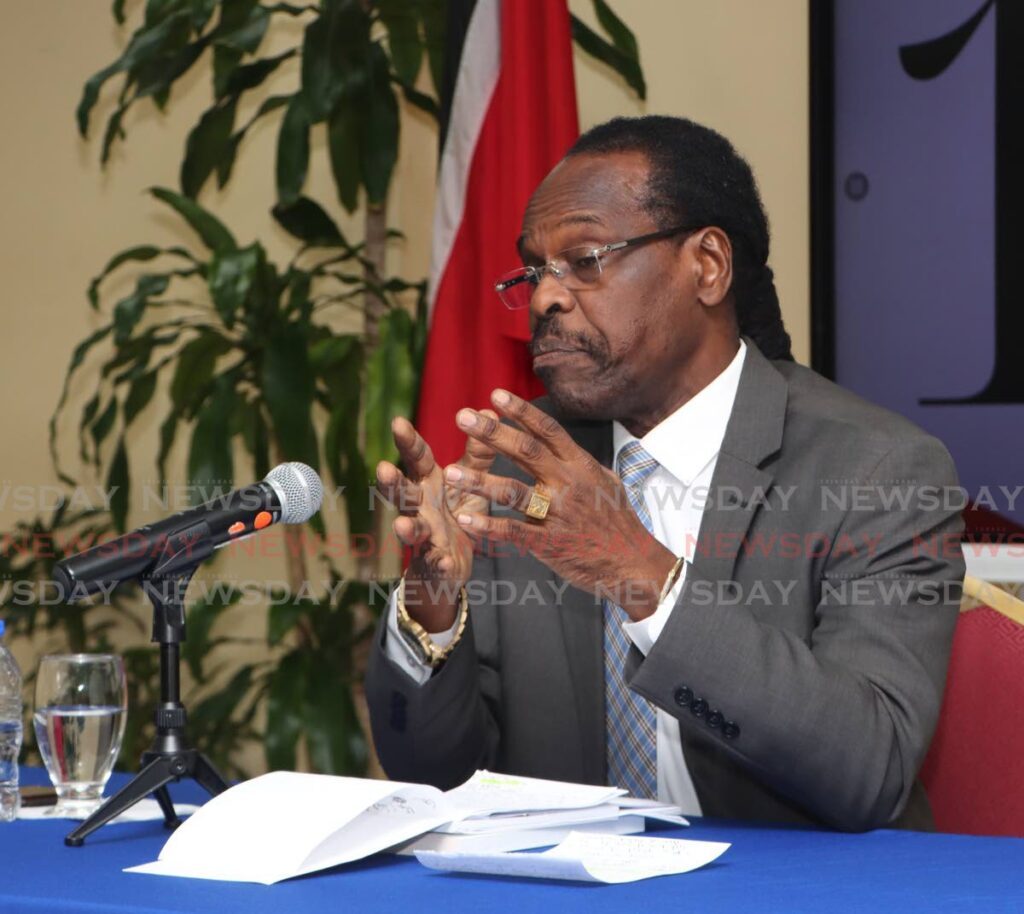Hinds: People becoming more enlightened on public matters

NATIONAL Security Minister Fitzgerald Hinds says the majority of the population understands there is no controversy connected to the Prime Minister's decision to resign his post and as PNM political leader.
He attributed this to people becoming better educated on public affairs and less likely to fall for the attempts of others to mislead them.
Hinds spoke in a radio interview on i95.5FM on January 12, the day after the PNM General Council met to discuss Dr Rowley's intention to resign as prime minister and party leader.
He said he was used to commentary in the media on important issues being uninformed and being used to create fluff and bacchanal.
But in the last week, Hinds said, he was impressed with the level of maturity in the public discourse about what was involved in prime ministerial and political leadership succession.
He said many people were actively referring to the Constitution when it came to the powers of the President and the way a prime minister was chosen.
Hinds attributed this in part to people becoming more educated and an increasing number of avenues where information can be found and objectively assessed.
He said the developments had "helped to enlighten the people of TT."
Hinds added that it augured well for the population being able to properly understand the facts of matters before them and not fall victim to the agendas of uninformed or mischievous people.
"We are not dealing with the same quality of operation now as existed or subsisted in 1995."
On January 11, after the PNM's General Council meeting at Balisier House, Port of Spain, party general secretary Foster Cummings said all PNM MPs had committed their support to Port of Spain North/St Ann's West MP Stuart Young as the next prime minister.
The General Council discussed Rowley's intention to retire from electoral politics before the end of the legal life of the government, Young to succeed him as prime minister and the party to hold a convention in September to elect a new political leader.
On January 9, the PNM's central executive had met to discuss matters related to Rowley's intention to resign.
On January 3, Rowley announced his intention to retire from electoral politics and promised a smooth transition after he resigned as prime minister and PNM political leader.
At a news conference on January 6, he said the PNM's parliamentary caucus of elected MPs had selected Young to succeed him as prime minister.
At the time, the vote was split 11 in favour of Young and nine for Arima MP Pennelope Beckles-Robinson.
While not giving a definite date for his resignation, Rowley says he should be finished with his last official duties, including a Caricom Heads of Government meeting in Barbados, well before Carnival.
Selection of a PM
THE selection of a prime minister is determined by Section 76 of the Constitution.
Section 76 (1) (a) states the President will appoint as prime minister "a member of the House of Representatives who is the Leader in that House of the party which commands the support of the majority of members of that of that House."
Section 76 (1) (b) states where the President finds the political party with the majority in the House does not have an undisputed leader, or that no party commands the support of a majority, the President appoints the member who in his or her judgement "is most likely to command the support of the majority of members of that House."
Neither of these situations applies in this case, with all 21 government MPs supporting Young.
The government has 21 MPs in the House now, after the death of D'Abadie/O'Meara MP Lisa Morris-Julian in December.
Whenever Rowley resigns as prime minister, a letter will be sent to President Christine Kangaloo indicating that Young commands the majority support among government MPs and should be appointed prime minister.
Once that happens, Young will be sworn into office.
Role of PNM political leader
ARTICLE 19 of the PNM's constitution says the political leader "shall be responsible to the party for the execution of its political affairs."
When the political leader executes this responsibility he shall act in consultation with the PNM's chairman, vice-chairman, lady vice-chairman, the deputy political leaders and the general secretary. This group comprises the political leadership of the party.
The PNM's annual convention is the forum where elections are held for all the party's executive posts, including political leader. This is done by secret ballot, using a one-man-one-vote system.
The general council usually holds the convention in September, but Article 17 gives give the council the discretion, for good reason, to summon it earlier.
Article 18 says the political leader is one of five executive posts with a tenure of four years. The others are chairman, vice-chairman, general secretary and Tobago council political leader.
Should any of these office-holders resign or be removed at a convention before the end of their term, someone must be elected to replace them.
Rowley has said the PNM will hold its annual convention on September 28 and he will not be party leader when his term legally expires in 2026.
He has been political leader since 2010 and was re-elected in the PNM's last internal elections in 2022.
Young will have to resign as PNM chairman to contest the political leader's post.
Should he remain chairman and no other members offer themselves as political leader, it is possible one of the PNM's three deputy leaders could serve as interim political leader.
PNM MPs Colm Imbert, Rohan Sinanan and Dr Nyan Gadsby-Dolly are the current deputy leaders.
MPs Pennelope Beckles-Robinson and Foster Cummings were believed to be potential leadership contenders, Both are among the MPs supporting Young to succeed Rowley as prime minister.

Comments
"Hinds: People becoming more enlightened on public matters"